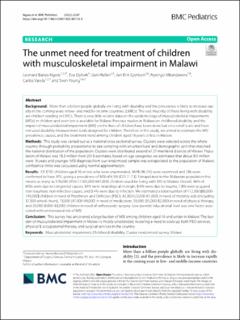| dc.description.abstract | Background: More than a billion people globally are living with disability and the prevalence is likely to increase rapidly in the coming years in low- and middle-income countries (LMICs). The vast majority of those living with disability are children residing in LMICs. There is very little reliable data on the epidemiology of musculoskeletal impairments (MSIs) in children and even less is available for Malawi. Previous studies in Malawi on childhood disability and the impact of musculoskeletal impairment (MSI) on the lives of children have been done but on a small scale and have not used disability measurement tools designed for children. Therefore in this study, we aimed to estimate the MSI prevalence, causes, and the treatment need among children aged 16 years or less in Malawi.
Methods: This study was carried out as a national cross sectional survey. Clusters were selected across the whole country through probability proportional to size sampling with an urban/rural and demographic split that matched the national distribution of the population. Clusters were distributed around all 27-mainland districts of Malawi. Population of Malawi was 18.3 million from 2018 estimates, based on age categories we estimated that about 8.9 million were 16 years and younger. MSI diagnosis from our randomized sample was extrapolated to the population of Malawi, confidence limits was calculated using normal approximation.
Results: Of 3792 children aged 16 or less who were enumerated, 3648 (96.2%) were examined and 236 were confirmed to have MSI, giving a prevalence of MSI of 6.5% (CI 5.7–7.3). Extrapolated to the Malawian population this means as many as 576,000 (95% CI 505,000-647,000) children could be living with MSI in Malawi. Overall, 46% of MSIs were due to congenital causes, 34% were neurological in origin, 8.4% were due to trauma, 7.8% were acquired non-traumatic non-infective causes, and 3.4% were due to infection. We estimated a total number of 112,000 (80,000-145,000) children in need of Prostheses and Orthoses (P&O), 42,000 (22,000-61,000) in need of mobility aids (including 37,000 wheel chairs), 73,000 (47,000-99,000) in need of medication, 59,000 (35,000-82,000) in need of physical therapy, and 20,000 (6000-33,000) children in need of orthopaedic surgery. Low parents’ educational level was one factor associated with an increased risk of MSI.
Conclusion: This survey has uncovered a large burden of MSI among children aged 16 and under in Malawi. The burden of musculoskeletal impairment in Malawi is mostly unattended, revealing a need to scale up both P&O services, physical & occupational therapy, and surgical services in the country. | en_US |

